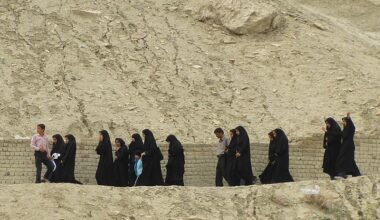
While Ramadan is a sacred month for Muslims, let us not forget that it is also an excuse for religious fanatics and theocratic Islamic governments to force individuals to adhere to their intolerable ideologies. While Ramadan is said to be a month of compassion, generosity, introspection, and tranquillity, it is also a month of persecution and pain during which those who refuse to comply with fasting rules are bullied and oppressed.
Many closeted apostates and liberal Muslims around the world face harsh punishment for defying fasting rules. They endure severe penalties, isolation, and exclusion in the name of religion. It is therefore important that, during Ramadan, we scrutinise such appalling attitudes, which are contrary to the spirit of human dignity and freedom.
In Pakistan, according to the Ehtram-e-Ramazan Ordinance, anyone eating in public places during fasting hours can be fined and/or jailed for three months. These draconian Ramadan laws have been used to harass and persecute minorities across the country. In 2016, a Hindu man in his eighties was beaten up for eating rice before Iftar (the fast-breaking evening meal during Ramadan). Such a horrific incident set a dangerous precedent in a society that is already plagued with ever-growing religious intolerance.
In 2014 in Iran, where fasting rules are also enforced by law, two men were publicly flogged for eating during fasting hours. In Nigeria this year, eleven Muslims were arrested for eating during Ramadan. In Oman, Muslims who break the fasting rules can be fined or arrested. In Egypt, where there is technically no legal enforcement of Ramadan, cafes have been stormed by police for not following Ramadan edicts.
Even in the West, this bullying is not uncommon. Allegedly, a non-Muslim man in England was recently bullied by his Muslim colleagues for eating during fasting hours in their presence. The full context of the video is unclear, but the man filming it can be heard using the slur ‘kuffar’ against the man who was eating.
It is absurd that those who are convinced that fasting is a spiritual necessity are obsessively concerned with whether others are participating in their rituals. There is a plethora of reasons why someone could not be fasting, including old age, illness, medicine, pregnancy, impending travel, not being a Muslim, or simply not feeling like it. Coercing people into not eating or drinking for your sake is not respecting someone’s religious sensibilities. It is a blatant instance of religious bullying. If someone’s faith is so shaky that they feel disturbed by the sight of another person eating, then perhaps they need to set their own house in order rather than inflicting pain on others.
To defy such rigid and draconian fasting rules, last month the Council of Ex-Muslims of Britain (CEMB) staged fast-defying picnics in London outside the embassies of Pakistan, Iran, Saudi Arabia, and Morocco—countries that prosecute people for eating in public during the fasting hours of Ramadan. I was an attendee.
Fast-defying activists drinking a toast outside the embassies were approached by staff and security officers, who continuously questioned the activists’ motivation for eating and drinking in protest of compulsory Ramadan fasting. The security guards and the staff watched over the activists through windows. As CEMB put it, ‘they weren’t too pleased to see us there and shared some disgruntled looks, and kept an eye on us, peeking through the windows.’
Ramadan bullying is just one of the many ways in which extremist Muslims oppress the vulnerable.
Outside the Saudi embassy, two armed police officers approached the protestors and asked them pointed questions about eating and drinking outside the embassy. CEMB spokesperson Ali Malik explained to them that ‘We’re not Muslim. You’re free to be a Muslim the same way we are free to drink.’ The officers even called their colleagues and a police van showed up right away, but those officers soon left when they realised no crime was being committed. The two armed officers remained and could be seen looking up public drinking regulations, presumably looking for an excuse to take action. They failed, but this shows how willing even the British police are to intimidate and harass Ramadan dissidents.
Maryam Namazie, the spokesperson for CEMB, wrote to me:
‘People are expected not to eat out of respect for Muslims’ religious sensibilities. For us, defying fasting during Ramadan is very crucial because we remember all the pressure and intimidation, the flogging, and the arrests that have been inflicted on those who defy fasting edicts. Even in Britain, if you have a Muslim name or you look Muslim, they’ll say “why are you not fasting?”. The whole idea of identity politics is such that people feel entitled, as if they have a right to ask you that and put pressure on you.’ (Lightly edited for clarity.)
She further added, ‘The imposition of Ramadan rules by brute force is linked to the rise of Islamism. Therefore, these fast-defying picnics are an important form of dissent against intimidating Islamists who seek to subjugate people and in solidarity with those who are persecuted during this bleak month for merely drinking or eating to allay their thirst or hunger.’
Ramadan bullying is just one of the many ways in which extremist Muslims oppress the vulnerable. Inside some Muslim communities, women are treated as second-class citizens and human rights are completely disregarded. Closeted apostates and liberals in these communities are the greatest victims of this extremism, as they are forced to be silent and obey at the price of ostracization—or worse. Those who criticise such dogma and bullying, whether they are Muslim or not, are frequently accused of being an ‘Islamophobe’ or a bigot, but this only serves to validate and strengthen the Islamists, which, in the end, only leads to harm—of Muslims as well as non-Muslims.
Society must be free to scrutinise and criticise practices that are incompatible with human rights. The fringe elements who seek to dominate public discourse through fear and intimidation need to be called out unequivocally. Only then can we protect the most vulnerable of all: the dissident minorities within minorities.
Further reading on Islam, Ramadan, and dissent
Interview with Maryam Namazie: ‘The best way to combat bad speech is with good speech’
Religion and the decline of freethought in South Asia, by Kunwar Khuldune Shahid
The price of criticising Islam in northern Nigeria: imprisonment or death, by Emma Park
The need to rekindle irreverence for Islam in Muslim thought, by Kunwar Khuldune Shahid
Breaking the silence: Pakistani ex-Muslims find a voice on social media, by Tehreem Azeem
From religious orthodoxy to free thought, by Tehreem Azeem
Faith Watch, March 2024, by Daniel James Sharp








Your email address will not be published. Comments are subject to our Community Guidelines. Required fields are marked *
Donate